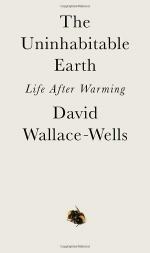|
This section contains 1,625 words (approx. 5 pages at 400 words per page) |

|
Summary
In the chapter “Storytelling,” Wallace-Wells examines the narratives humans currently use to process climate change, and makes predictions for how climate changes will affect narrative efforts in the future. He writes about the reliable contemporary popularity of disaster and apocalypse movies – which seem to him “as though we are displacing our anxieties about global warming by restaging them in theaters of our own control” (143) – and suggests that in the future climate change “may come to be regarded, at least by some, as the only truly serious subject” (145). He pushes his argument farther to say that climate may eventually “cease to be a story and become, instead, an all-encompassing setting” (145). Wallace-Wells examines the villainies and parables that humans have created to reckon with climate change – such as the “evilness” of oil companies, or “plastic panic” – and points out that complicity “does not make for...
(read more from the Pages 141 - 216 Summary)
|
This section contains 1,625 words (approx. 5 pages at 400 words per page) |

|




